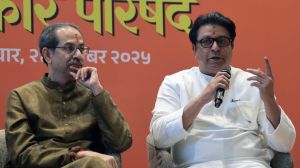Strings across the sea
All musicians seem to possess a very meditative smile. And sitar maestro Ustad Usman Khan is no exception. Does it signify the smile of s...

All musicians seem to possess a very meditative smile. And sitar maestro Ustad Usman Khan is no exception. Does it signify the smile of success, after years of struggle for recognition? Yes, it does, confirms the Ustad, who hails from a family dedicated to music, who had to toil for his success. Born in Dharwad, he received his training from his father, Ustad Abdul Kareem Khan, but chose to settle in Pune to establish his own identity.
As one enters his music school, Naad which means the resonance of sound, on 11th lane, Prabhat Road, the soft strains of the sitar reach one8217;s ears and you enter expecting to see Indian students immersed in music. But one is in for a surprise. The sitar has established a universal language and one notices more foreigners than Indians strumming the instrument, sitting in the hall.
Gushes Nodiko Takafuku, a Japanese lady who is fulfilling her dream of learning the sitar, 8220;It8217;s very beautiful, so exciting and interesting, but it8217;s so8230;ooo difficult!8221; Two students from Singapore and Mauritius, practicing hard at their music, nod understandingly.
Khan has students from all parts of the world, and some of his students are spreading the sitar8217;s language far and wide. Says Khan, 8220;A French girl, Sylvie Hillie, after spending many years here is teaching in France now, and recently a Korean girl Kim, a brilliant student, has just returned to Korea.8221; Kim started at the tender age of 10 and has reached a stage where she can enlighten others.
Communication is a bit of a problem with foreigners who can neither converse in English or Hindi nor identify with Indian classical music. 8220;For them it8217;s different, and they refer to their own music while learning. So it takes them some time to understand Indian classical music,8221; he explains. But their eagerness to be sitar-savvy helps overcome all hurdles.
Khan has his teaching modus operandi on track. 8220;I see each student as an individual. I study each student8217;s strengths and weaknesses, their grasping power, their intensity and temperaments,8221; he maintains. He is adamant about teaching only serious students, 8220;Otherwise it8217;s a waste of time and money. I normally accept students who come with some recommendations. I study their attitude and can make out if they are serious or not. Music is sadhana, it8217;s for the spiritually developed. If you are doing it for commercial success, then it8217;s dangerous,8221; he points out.
Khan8217;s students come from all age groups. 8220;Children start learning from the age of seven or eight, by then they are able to hold the instrument. There are lots of young people in the class, and looking at the response I really believe that inspite of pop music, classical music will remain, as it has lasted these 1000 years,8221; he insists.
The Ustad8217;s time is taken up with either teaching or travelling for concerts, which happens quite frequently. And some students go with him, especially the expatriates who want to attend as many concerts as possible, 8220;Because they don8217;t get such opportunities in their own countries8221;.
The students themselves are very spirited and engage themselves wholeheartedly in the class. The fully-carpeted music room requires the students to leave their footwear outside, and once they are inside they place flowers at the feet of the huge idol of Saraswati, Goddess of Learning.
Another activity which they enjoy is their monthly get-together, where each student gives a solo performance, sitting on the dias. Says Khan, 8220;it8217;s a test for them. Because I can teach them music, but I cannot help them get over their stage fright. In this way, we also focus on areas of improvement. It8217;s a learning experience for them8221;.
And this is not all! 8220;Twice a year, we have a musical picnic. We spend a couple of days close to nature, taking our instruments along with us. The students learn a lot there, because the grasping power is increased in natural surroundings,8221; clarifies Khan.
So, here8217;s one cultural ambassador whose sitar strings have the ability to create harmony across all countries.
- 01
- 02
- 03
- 04
- 05































